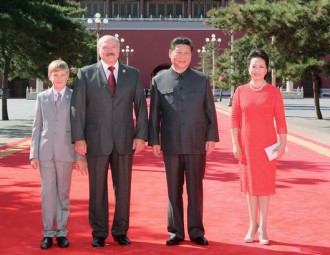Tatsiana Sshytsova: “A boy named Kolya” is a symbol of political appropriation of the future
 Global Look Press
Global Look Press
What one should do if the future is occupied?
One should work with modernity, Tatsiana Sshytsova, the professor of the European State University, Doctor of Philosophy believes.
“EuroBelarus” Information Service asked Mrs. Tatiana to tell whether she has an idea of what our country might look like while time passes.
- I have no clear answer to this question. I think that its very formulation requires some interpretation, some concretization. In general, the reason of this question is, of course, understandable: the country is undergoing political stagnation, a complete uncertainty in terms of the prospects for socio-economic development, and so on. In this situation (which is also emphasized by an internal crisis in all key areas of our lives – economic, educational, medical, cultural, etc.) such questions are inevitable. But what discussion about the future is at all appropriate and suitable in our situation?
It is the function of our imagination to draw "the image(s) of the future”. I think that speculating about the future of Belarus in this regard doesn’t correspond to the situation. Of course, writers can give freedom to their fantasy, only if literature, in principle, is the "promised land" for the imagination. But even here, I think, our situation generates a very specific request – real one, where social phantasmagorias in the genre or with the elements of dystopia (the most striking from the recent examples are "Alindarka’s Kids” by Alhierd Baharevich and “Mova” (Bel. "Language") by Victar Martsinovich).
It is worth noting that for the classic modern designing "bright future" was a paradigmatic act, which the former Soviet citizens know about from their own historical experience of "building communism". It is known that the social teleology of modernity (when some ideal aim is presented as feasible in the course of the social progress) was first subjected to a systematic deconstruction in contemporary thinking (let us recall the "Dialectic of Enlightenment" by Frankfurt School philosophers).
I cite all these examples to show that the question of how to talk about the future today is not far-fetched. Furthermore, its problematics has different formula and different pathos depending on which social field we format it – in relation to the late modernity in general or in relation to the modern Belarusian society specifically.
Today, there are two groups of people in Belarus who are constantly addressing the topic of the future with a more or less reasonable pragmatic purposes: it is politicians in office, who are in charge of strategic planning, and political scientists whose professional activity involves the alignment of political forecasts.
Interestingly, the answer to the question about why the strategic planning is always constrained in our country, can be given in terms of which attitude to the future is a frame for the most patriotic motives of the current strategies. We can exemplify it with one of the key media images that represent modern authorities – "a boy named Kolya", who is always accompanying the president in his official visits and in the performance of his functions. I use quotation marks in order to emphasize that I don’t mean a real child, but a political symbol, which tells us that the future is already occupied. “A boy named Kolya” is included in all the relevant public self-presentations of the "Lukashenka's regime". This strategy deprives the future of its main moral function our attitude towards it ceases to generate hope. We are dealing with the regime that blocks the future as a horizon (a possibility) of updating. In this sense, Lukashenka’s regime can be defined as the political occupation of the future. It is demoralizing (leads to corruption schemes) and undermines the possibility of collective mobilization for the joint construction of the future. In this situation, any strategic planning is doomed either to profanity or to the system failure.
All that above-said explains my skepticism towards the development of various alternative projects and social development programs. They all have sense only if there are real political resources for their implementation. Otherwise, all this is empty wishful thinking. In this regard, it is very indicative of Belarus to have a minimalist vision of the future when it comes to everyday common sense. "Other Belarus" is a predominantly negative projection of " not like it is now."
The minimalist image of the future of Belarus doesn’t mean inactivity. If the future is occupied, you need to work with modernity - to multiply the places and events where "a different Belarus" comes true "here and now". It seems to me that in our situation it is time to put into practice the concept of political ecology, because it is a multiplication of chronotopes in which it is possible to breathe.
-
03.01
-
07.10
-
22.09
-
17.08
-
12.08
-
30.09



























